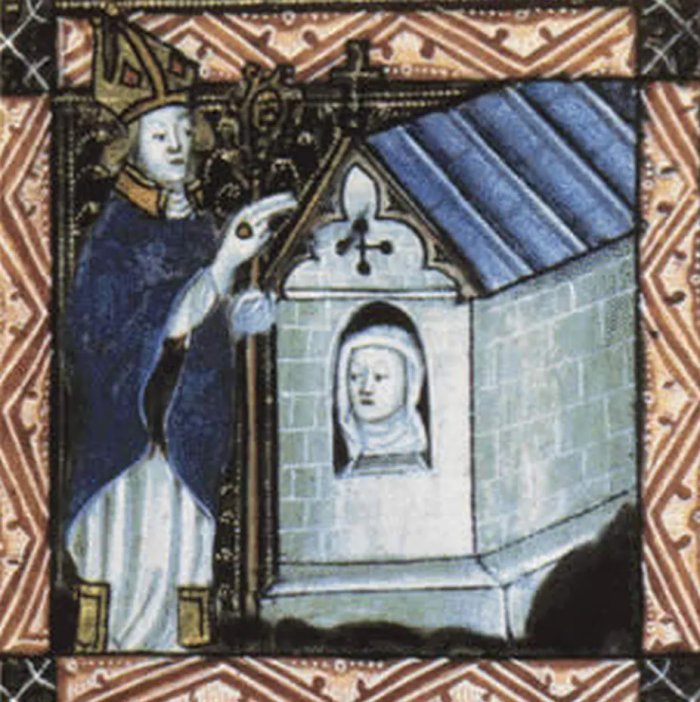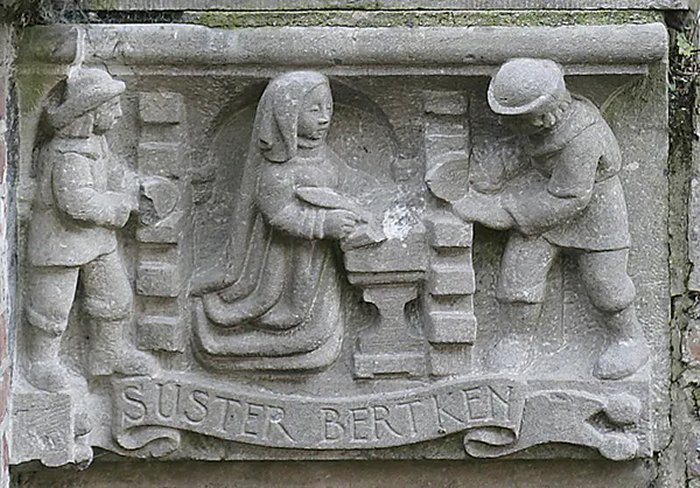Coronavirus: Advice From The Middle Ages For How To Cope With Self-Isolation
AncientPages.com - The pandemic of COVID-19 is often called “unprecedented” – and for many people cooped up in their homes in different countries, the experience is both unparalleled and challenging. But in late-medieval Europe, individuals self-isolated professionally. Some people – women particularly – permanently withdrew from society to live walled in, alone in a room attached to a church.
Enclosing of an anchoress (14th century). Cambridge, Corpus Christi College, MS 079: Pontifical, CC BY-NC-SA
Guides for, and texts written by, these female “anchorites” – as the women were known – from Britain and continental Europe give us descriptions of their way of living and recount their reflections. So what can these medieval women teach us about how to cope with self-isolation?
These anchorites chose to be confined in these cramped cells for many reasons. According to medieval religious culture, a life of prayer on behalf of others vitally supported society. Isolation empowered women to express their love for Christ, and minister to their fellow believers through their prayers and counsel. Anchorites were even presented as possessing “super powers” of interceding for the deceased in purgatory.
Furthermore, in the late Middle Ages, devotion among laypeople – people who are not clergy – flourished. Life as an anchorite offered laywomen an option to express this piety, but offered more freedom for individual contemplation (and solitude) than a nun’s life.
Warnings in guides for anchorites also hint at less spiritual motives. Life as a recluse, paradoxically, situated anchorites at the heart of their communities and could transform them into religious celebrities. Their cells often faced busy roads in bustling cities and doubled as a bank, teacher’s cubicle, and storehouse of local gossip.
A king consults an anchorite. Beinecke MS 404 (Rothschild Canticles), Yale Library
Don’t expect comfort
The 13th-century, medieval English guide for female anchorites, Ancrene Wisse, warns recluses not to look for comfort. Instead, the anchorite should remind herself that she was enclosed not just for her own benefit, but for the sake of others too.
She is told to “gather into your heart all those who are ill or wretched” and “feel compassion”. By self-isolating, the anchorite “holds [all fellow believers] up” with her prayers. Now, nurses and doctors are urgently calling for a similar commitment from the public, when begging “Stay home for us.”
The Wisse’s advice has a flavour that feels equally relevant today. Self-isolation may be easier to bear if instead of seeing it as a stretch of boring but comfy nights in, you recognise it as an unpleasant, stressful experience – but also visualise all the people whose health you are protecting by staying home.
Acknowledging vulnerability
The earliest-known English woman writer, Julian of Norwich (c.1343–c.1416) – an anchorite – likewise encouraged readers to acknowledge their own vulnerability, but suggested perceiving it as a strength. She assured readers in her late 14th-century or early 15th-century text, A Revelation of Love, that suffering and difficulties will not defeat them:
Christ did not say, ‘You shall not be perturbed, you shall not be troubled, you shall not be distressed,’ but he said, ‘You shall not be overcome.’
Modern statue of Julian of Norwich at the west entrance to Norwich Cathedral. Evelyn Simak, CC BY-ND
Julian promises that readers will experience emotional turmoil during any crisis but will ultimately conquer it. This promise parallels modern survival psychology. When adapting to life during a crisis, acknowledging the challenging circumstances as forming one’s real life now is essential. Yet one should simultaneously remember that one is doing one’s utmost to return to a better, pre-crisis style of living. Only by acknowledging our vulnerability – both physical and mental – and consequently taking action to protect and care for others and ourselves, will we make it through.
A reconstruction of Julian of Norwich’s cell at St Julian’s in Norwich. Godelinde Gertrude Perk
Guarding the senses
According to manuals for anchorites, they should guard their metaphorical windows (their five senses) and actual cell windows, to prevent falling into temptation and being distracted from their prayers and meditation. The Wisse declares: “disturbance only enters the heart through something … either seen or heard, tasted or smelt, or felt externally.”
The external world can upset one’s interior world. Dutch anchorite Sister Bertken (1427-1514) recounts this confusion in a poem:
The world held me in its power
with its manifold snares
it deprived me of my strength.
Yet this nervousness about the effect of sensory input can also be understood as a medieval analogue to a warning against fake news or anxious over-consumption of news. Several guides recommend having a female friend scrupulously guarding the anchorite’s window, refusing to allow access to visitors who spread gossip and lies. Social media today can be a little like such visitors.
The Enclosure of Sister Bertken. Photo by E de Groot & S Pieters, University of Utrecht
Keep busy, keep sane
Anchorites and writers of manuals for anchorites also reflected upon how to keep sane. Keeping occupied prevents one from climbing the walls. British Cistercian monk, Abbot Aelred of Rievaulx (1110-1167), tells his sister, an anchorite, in A Rule of Life for a Recluse that: “Idleness … breeds distaste for quiet and disgust for the cell.”
See also:
What Was It Like To Be A Student In The Middle Ages?
Why Has The Leaning Tower Of Pisa Survived Strong Earthquakes Since The Middle Ages?
Routines are key. Anchorites recited sequences of prayers, psalms and other Bible readings at fixed points of the day. According to modern survival psychology, dividing a problem or stretch of time into manageable steps is crucial when faced with a crisis. Equally important is performing each step one by one, never looking further ahead than the next step.
Mentally absorbing hobbies, such as crafts, gardening or reading, are another time-honoured strategy for dealing with self-isolation. After recommending sewing clothes for the poor and church vestments, the Wisse assures anchorites that keeping occupied will shield their minds against temptation:
For while [the devil] sees her busy, he thinks like this: ‘It would be useless to approach her now; she can’t concentrate on listening to my advice.’
These suggestions are easily translatable to today. After all, according to survival psychology, performing manageable, directed actions with a purpose is crucial in crises. Incidentally, the Wisse also recommends keeping a cat.
On the one hand, self-isolation can feel limiting – Julian of Norwich also felt that: “This place is prison,” she said, referring either to earthly life or her cell. But the cell’s cramped space also granted medieval women a paradoxical, spiritual freedom. In his letter to the anchorite Eve of Wilton, the 11th-century monk Goscelin of St Bertin exclaims: “'My cell is so narrow,’ you may say, but oh, how wide is the sky!”
Written by Godelinde Gertrude Perk, Postdoctoral researcher in Medieval Literature, University of Oxford
This article is republished from The Conversation under a Creative Commons license. Read the original article.
More From Ancient Pages
-
 Half-A-Million Year Old Signs Of Extinct Human Species Discovered In Polish Cave
Archaeology | Nov 30, 2022
Half-A-Million Year Old Signs Of Extinct Human Species Discovered In Polish Cave
Archaeology | Nov 30, 2022 -
 Yam: Tyrannical Hydra-Like Sea Monster God Cast Out Of Heaven
Featured Stories | Aug 3, 2016
Yam: Tyrannical Hydra-Like Sea Monster God Cast Out Of Heaven
Featured Stories | Aug 3, 2016 -
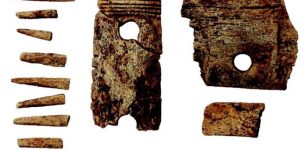 Large Anglo-Saxon Burial With Bodies And Roman Artifacts Found At Bicker Fen, Lincolnshire, UK
Archaeology | Aug 14, 2023
Large Anglo-Saxon Burial With Bodies And Roman Artifacts Found At Bicker Fen, Lincolnshire, UK
Archaeology | Aug 14, 2023 -
 Can Peptide Droplets Explain The Emergence Of The First Living Organisms On Earth?
Archaeology | Oct 20, 2021
Can Peptide Droplets Explain The Emergence Of The First Living Organisms On Earth?
Archaeology | Oct 20, 2021 -
 Unexplained Accounts Of Mysterious Fires – ‘Burning’ Questions Remain Unanswered – Part 1
Featured Stories | Aug 2, 2019
Unexplained Accounts Of Mysterious Fires – ‘Burning’ Questions Remain Unanswered – Part 1
Featured Stories | Aug 2, 2019 -
 The Curse Of Chief Chocorua Who Died On The Mountain That Bears His Name
Featured Stories | Mar 9, 2019
The Curse Of Chief Chocorua Who Died On The Mountain That Bears His Name
Featured Stories | Mar 9, 2019 -
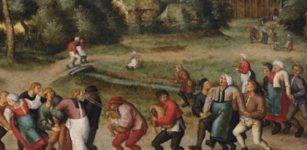 Unexplained Phenomenon Of The Dancing Mania That Occurred During The Middle Ages
Featured Stories | Aug 1, 2014
Unexplained Phenomenon Of The Dancing Mania That Occurred During The Middle Ages
Featured Stories | Aug 1, 2014 -
 Being Left-Handed Was A Sign Of Evil Until Only Recently
Ancient History Facts | Jun 29, 2018
Being Left-Handed Was A Sign Of Evil Until Only Recently
Ancient History Facts | Jun 29, 2018 -
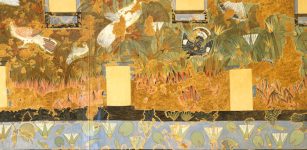 Scientists Identify Birds On Magnificent Ancient Egyptian Artwork Found In Amarna
Archaeology | Dec 28, 2022
Scientists Identify Birds On Magnificent Ancient Egyptian Artwork Found In Amarna
Archaeology | Dec 28, 2022 -
 Underwater Nabataean Temple With Marble Altars Discovered In Pozzuoli
Archaeology | Apr 12, 2023
Underwater Nabataean Temple With Marble Altars Discovered In Pozzuoli
Archaeology | Apr 12, 2023 -
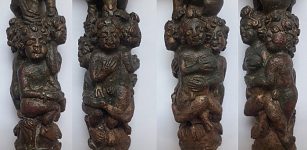 Roman Britain Executions Revealed – New Evidence
Archaeology | Aug 14, 2021
Roman Britain Executions Revealed – New Evidence
Archaeology | Aug 14, 2021 -
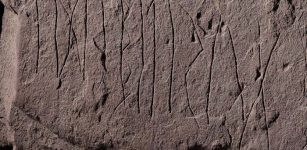 Mysterious Svingerud Stone – World’s Oldest Rune Stone With Enigmatic Inscriptions Investigated By Experts – What Does It Say?
Archaeology | Jan 17, 2023
Mysterious Svingerud Stone – World’s Oldest Rune Stone With Enigmatic Inscriptions Investigated By Experts – What Does It Say?
Archaeology | Jan 17, 2023 -
 Full Moon In Ancient Myths And Legends Of Our Ancestors
Featured Stories | Nov 14, 2016
Full Moon In Ancient Myths And Legends Of Our Ancestors
Featured Stories | Nov 14, 2016 -
 Were The Knights Templar Guilty Or Innocent Of The Crimes Laid Against Them?
Featured Stories | Dec 24, 2020
Were The Knights Templar Guilty Or Innocent Of The Crimes Laid Against Them?
Featured Stories | Dec 24, 2020 -
 Unexpected Discovery 130,000-Year-Old Neanderthal Stone Tools In Poland
Archaeology | Oct 30, 2023
Unexpected Discovery 130,000-Year-Old Neanderthal Stone Tools In Poland
Archaeology | Oct 30, 2023 -
 Ginnungagap From Which The World, Gods, Humanity And All Life Emerged In Norse Beliefs
Myths & Legends | Dec 11, 2024
Ginnungagap From Which The World, Gods, Humanity And All Life Emerged In Norse Beliefs
Myths & Legends | Dec 11, 2024 -
 Tomb Of Christopher Columbus Finally Found But There Is One Problem With His Body
Archaeology | Apr 9, 2022
Tomb Of Christopher Columbus Finally Found But There Is One Problem With His Body
Archaeology | Apr 9, 2022 -
 Eastern Necropolis Of Ancient Thracian And Roman City Of Serdica – Unearthed
Archaeology | Apr 10, 2017
Eastern Necropolis Of Ancient Thracian And Roman City Of Serdica – Unearthed
Archaeology | Apr 10, 2017 -
 Cnut The Great – England’s Danish King And Ruler Of One Of The Largest Nordic Empires
Featured Stories | Jun 15, 2020
Cnut The Great – England’s Danish King And Ruler Of One Of The Largest Nordic Empires
Featured Stories | Jun 15, 2020 -
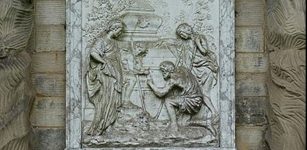 Shepherd’s Monument Mystery: Yet Another Undeciphered Inscription
Featured Stories | Jun 26, 2023
Shepherd’s Monument Mystery: Yet Another Undeciphered Inscription
Featured Stories | Jun 26, 2023

